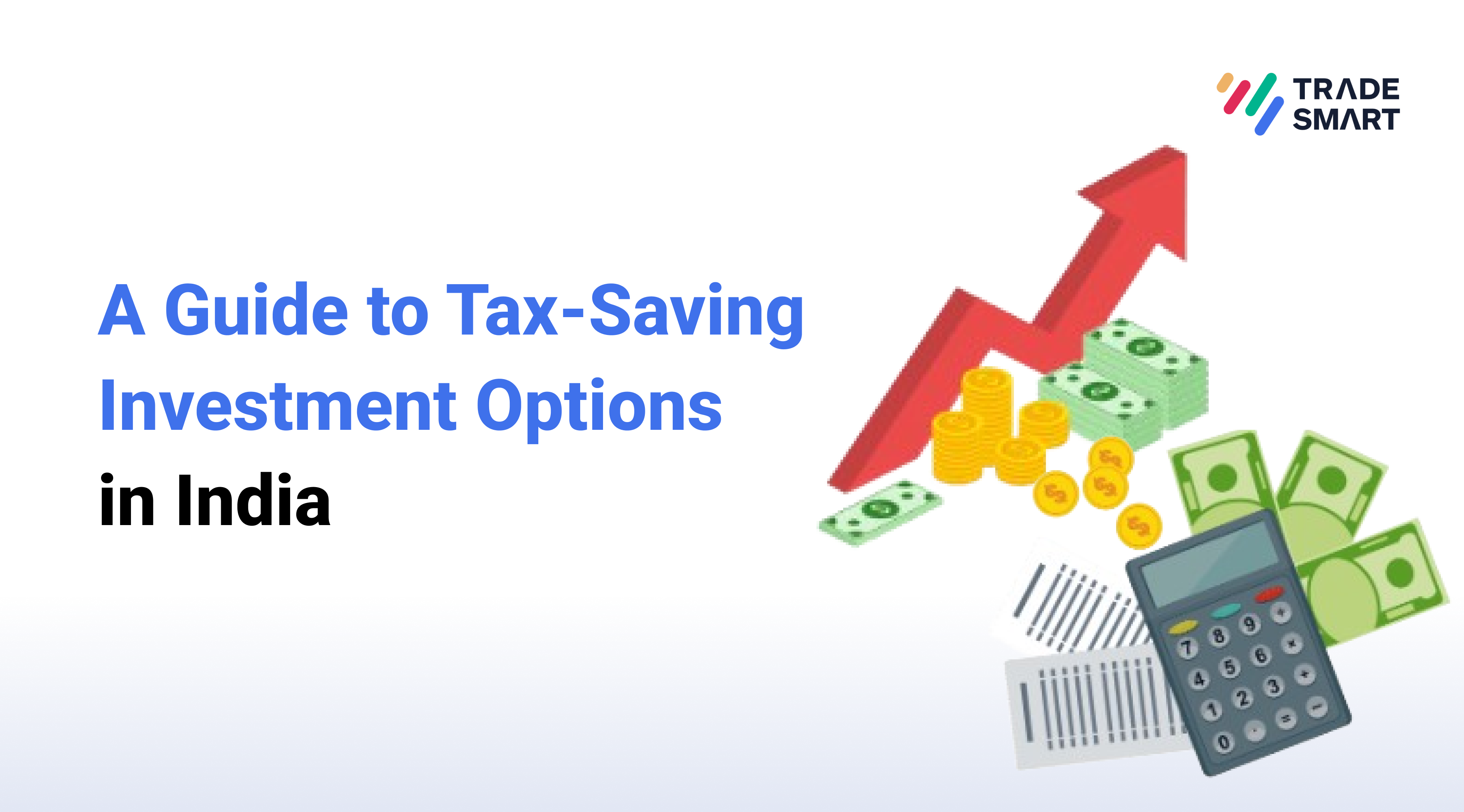
While taxes are important, they can take a significant amount out of your income. Tax-saving investment options are a great way to build wealth for the future while reducing the tax burden at the same time.
In this article, we will explore various options like the Public Provident Fund (PPF) and Equity Linked Saving Schemes (ELSS) that can provide tax benefits under the various sections of the Income Tax Act.
Why Are Tax-Saving Investments Important?
Tax-saving investments play a crucial role in financial planning by offering opportunities to reduce taxable income and minimise tax liabilities.
Tax-saving investments often have lock-in periods, which encourages you to save and invest for the long term. This helps develop a habit of disciplined savings and ensures that you have a corpus for future financial goals such as retirement, children’s education, buying a house, etc.
Tax-saving investments come in various forms such as Equity Linked Savings Schemes (ELSS), Public Provident Fund (PPF), National Pension Scheme (NPS), tax-saving fixed deposits, and so on. Investing in these instruments allows you to diversify your investment portfolio, spreading out risk.
While the primary objective of tax-saving investments is to save taxes, these options can also generate returns over time. The return potential varies depending on the chosen instrument and market conditions. Therefore, it is important that you assess your risk appetite and choose investments that align with your financial goals.
Best Tax-Saving Investment Options
Various tax-saving investment options are available to investors seeking to reduce their taxable income and save on taxes. Some common options include:
Equity Linked Savings Schemes (ELSS)
ELSS funds are mutual funds that invest primarily in equities and offer tax benefits. It has a lock-in period of 3 years which encourages long-term investment horizons and aligns with the goal of wealth accumulation. ELSS also offers the potential for higher returns compared to traditional fixed-income instruments.
ELSS funds offer investors the opportunity to save tax under Section 80C of the Income Tax Act where investors can claim a deduction of up to Rs. 1.5 lakhs.
Public Provident Fund (PPF)
PPF is a government-backed savings scheme with a lock-in period of 15 years, during which investors cannot withdraw their funds except under specific conditions. The interest earned on PPF is tax-exempt, making it an attractive tax-saving investment option for individuals.
One of the key advantages of investing in PPF is its flexibility. Investors can choose the amount they want to invest each year, with a minimum of Rs. 500 and a maximum of Rs. 1.5 lakhs. This allows investors to manage their cash flows and make contributions according to their financial capabilities and investment goals.
National Pension System (NPS)
NPS is a pension scheme that allows individuals to invest in a mix of equity, debt, and government securities. NPS aims to provide retirement income to subscribers by accumulating contributions over their working years.
Under Section 80CCD(1), salaried employees can claim tax deductions on their contributions up to 10% of their salary, with a limit of Rs. 1.5 lakhs. An additional deduction of Rs. 50,000 per year can also be claimed under Section 80CCD(1B).
NPS has a lock-in period until retirement, with partial withdrawals allowed under specific conditions like medical emergencies or children’s education.
Tax-saving Fixed Deposits (FDs)
Tax-saving Fixed Deposits (FD) are considered one of the safest investment options available. While they may not provide very high returns, they offer stability and guaranteed returns. Tax deductions under Section 80C can be availed for certain fixed deposits with a lock-in period of 5 years.
One of the advantages of investing in fixed deposits is the ease of understanding. Unlike other investment options, fixed deposits have a fixed interest rate and a predetermined maturity period. This makes it a popular choice for risk-averse investors who prefer a predictable income stream. It is important to note that the interest earned on tax-saving FDs is taxable.
Unit Linked Insurance Plans (ULIPs)
ULIPs are financial products that combine insurance coverage with investment options. They have a lock-in period of 5 years. With ULIPs, a portion of the premium paid goes towards providing life insurance coverage, while the remaining amount is invested in various investment funds such as equity, debt, or a combination of both.
Premiums paid towards ULIPs are eligible for tax deduction under Section 80C of the Income Tax Act, up to a limit of Rs. 1.5 lakhs. Maturity benefits from ULIPs can be tax-exempt under Section 10(10D) if the total annual premium does not exceed Rs. 2.5 lakhs.
If you surrender the ULIP before 5 years, the maturity benefit and the death benefit can become taxable.
Sukanya Samriddhi Yojana (SSY)
SSY is a government-backed savings scheme specifically designed for the financial security and education of the girl child. It offers various benefits, including tax deductions under Section 80C of the Income Tax Act.
Eligible for tax deductions under Section 80C of the Income Tax Act, investors can claim a deduction of up to Rs. 1.5 lakhs in a financial year for the amount deposited in the SSY account. The minimum investment amount required to open an SSY account is Rs. 250, making it accessible to individuals from diverse economic backgrounds.
Another notable feature of SSY is its tenure, which spans 21 years from the date of opening the account or until the girl child gets married after reaching the age of 18 years, whichever comes earlier. This ensures that the investments made in the scheme have sufficient time to grow and accumulate interest.
National Savings Certificate (NSC)
NSC is a small saving instrument backed by the Indian Government, offering investors guaranteed returns. NSC accounts can be opened at any post office in India, making them accessible to individuals across the country.
These certificates have a lock-in period of 5 years and offer tax deductions of up to Rs. 1.5 lakhs under Section 80C. The interest accrued on NSC is taxable, but it is reinvested and is eligible for tax benefits.
One unique feature of NSC is that it can be used as collateral for obtaining loans from banks. This makes it an attractive option for individuals who may require liquidity in the future. Additionally, NSC certificates can be easily transferred from one person to another, providing flexibility in case of any unforeseen circumstances.
Conclusion
Tax-saving investment options offer individuals a way to reduce their tax liability while building a foundation for potential long-term wealth. It is vital to understand the key features, risks, and returns associated with each investment option before making a decision. By aligning their investment strategy with their financial goals and risk tolerance, individuals can make informed choices and maximise their savings. It is advisable to seek guidance from a financial advisor or tax professional to make the most of tax-saving investment options and stay updated with the latest tax laws.
Interested in ELSS investments? For easy and hassle-free investing, check out our mutual fund mobile application TradeSmart MF. It lets you compare the leading ELSS funds available in the market so that you can choose the best-performing scheme for maximum returns.
Disclaimer: The information provided in this article is for educational purposes only and should not be construed as financial or tax advice. Tax laws and regulations may vary and change over time, and the applicability of tax-saving investment options may differ based on individual circumstances. Readers are encouraged to consult with a qualified financial advisor or tax professional to assess their specific financial situation and determine the most suitable investment strategy. The author and publisher do not assume any liability for any loss or damage resulting from reliance on the information provided herein.
FAQs
Why are tax-saving investments important?
Tax-saving investments offer possibilities to save money on taxes while building wealth for the future. They also encourage disciplined savings and help achieve long-term financial goals.
What are the different tax-saving investment options in India?
There are several tax-saving investment options in India, such as:
- Equity Linked Saving Schemes (ELSS)
- Public Provident Fund (PPF)
- National Pension System (NPS)
- Tax-saving Fixed Deposits (FDs)
- Unit Linked Insurance Plans (ULIPs)
- Sukanya Samriddhi Yojana (SSY)
- National Savings Certificate (NSC)
Are tax-saving investments risk-free?
Like any other investments, tax-saving investments are also subject to market risks. Options like PPF and tax-saving FDs are considered to be safer but can offer lower returns.
How can I claim benefits on these tax-saving investment options?
Tax benefits on these investments can be claimed under relevant sections of the Income Tax Act. For example:
- ELSS investments qualify for deductions under Section 80C.
- PPF investments qualify for deductions under Section 80C.
- NPS contributions qualify for deductions under Section 80CCD(1) and Section 80CCD(1B).
- ULIP premiums qualify for deductions under Section 80C and Section 10(10D).
- SSY investments qualify for deductions under Section 80C.
- NSC investments qualify for deductions under Section 80C.
How should I choose the best tax-saving investment option?
To choose the right option, consider factors such as your financial goals, risk tolerance, lock-in periods, expected returns, and liquidity requirements. Consulting with a financial advisor can help you decide the best option that aligns with your financial goals.












